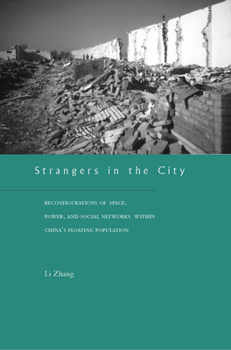Strangers in the City: Reconfigurations of Space, Power, and Social Networks Within China's Floating Population
Select Format
Select Condition 
Book Overview
With rapid commercialization, a booming urban economy, and the relaxation of state migration policies, over 100 million peasants, known as China's "floating population," have streamed into large cities seeking employment and a better life. This massive flow of rural migrants directly challenges Chinese socialist modes of state control. This book traces the profound transformations of space, power relations, and social networks within a mobile...
Format:Paperback
Language:English
ISBN:0804742065
ISBN13:9780804742061
Release Date:October 2002
Publisher:Stanford University Press
Length:304 Pages
Weight:0.94 lbs.
Dimensions:0.7" x 6.0" x 9.0"
Customer Reviews
1 rating
Rural Migrants in Beijing
Published by Thriftbooks.com User , 20 years ago
The economic reform that started in China in 1978 has brought about the creation of floating population, in which as many as 100 million people left their villages and streamed into cities where manufacturing factories and businesses were booming. In the cities, these rural migrants are considered strangers and outsiders. Since they are denied formal urban membership and substantive rights, they have to struggle hard for a living space. How did they deal with different powers in order to claim their space and have their own rights guarded and protected?For those interested in knowing about the formation conditions and existence strategies of the floating population in China, Li Zhang's book is worth reading. This is an ethnographic study on a particular migrant enclave in Beijing, which is called Zhejiangcun and only five kilometers from China's political centre, Tiananmen Square. The largest migrant settlement in Beijing, Zhejiangcun is mainly made up by the petty entrepreneurs originating from Wenzhou, a municipal city in Zhejiang province. It took shape in the 1980s and had nearly 100,000 migrant workers in 1995. Making use of pre-accumulated small capital and extended kinship ties, the entrepreneurs run family-based businesses mainly in garment manufacturing and trade. The settlement appears startlingly different from those formed by migrant workers (mingong) who have nothing but their labor to sell and depend heavily on the urban labor market for work. As small manufacturers and traders with economic resources, the Wenzhou migrant entrepreneurs in Zhejiangcun have the edge over other migrant workers as they are more capable to create native-place-based enclaves, workable social connections, and higher business flexibility. As reflected in the subtitle of the book, Li Zhang explores three key issues - space, power, and social networks. More specifically, she demonstrates how the Wenzhou migrants gained, lost, and rebuilt a space in Beijing by strengthening social networks with fellow natives and forging power relations with the local government officials.The book is well structured into a chronological order to show the formation and changes of the space in Zhejiangcun. Chapter 1 is a broader analysis of how the Chinese party system attempted to control and to manage the floating population that has grown in numbers in many cities. Li Zhang argues that the rural migrants, while their everyday practices were to some extent regulated by the government, they were able to create "alternative modes of social life and multifocal community life beyond a single, fixed geographic location." (p. 20).In Chapter 2, Li Zhang traces how a distinctive historical commercial culture and petty capitalist economy nurtured Wenzhou migrant's present economic and spatial practices. She maps their migration routes and underscores the importance of family and native-place networks in the migration trajectories.Chapters 3 and 4 explore how the privatizat




